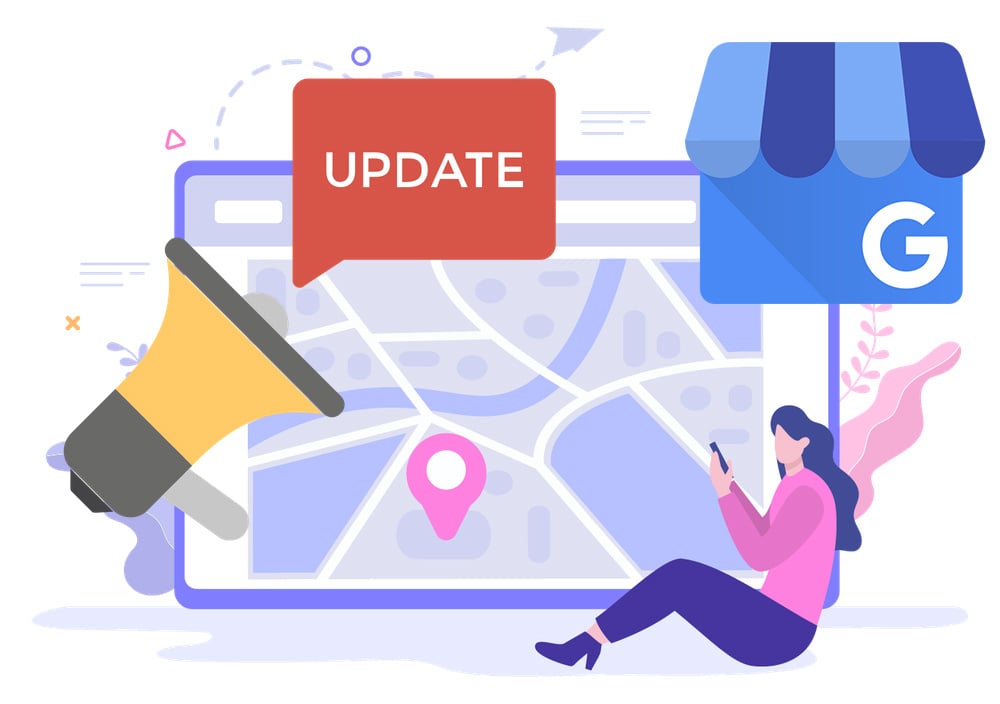Enjoy a Google-friendly done-for-you website in days!
Only GoSite launches a complete, affordable online presence for local service pros in just 1 week.
20 Problems You'll Have If You Try to Build Your Own Website
Discover why local business owners should leave website building to the experts. Save time and hassle with our professional web design services. Learn more in our latest blog.
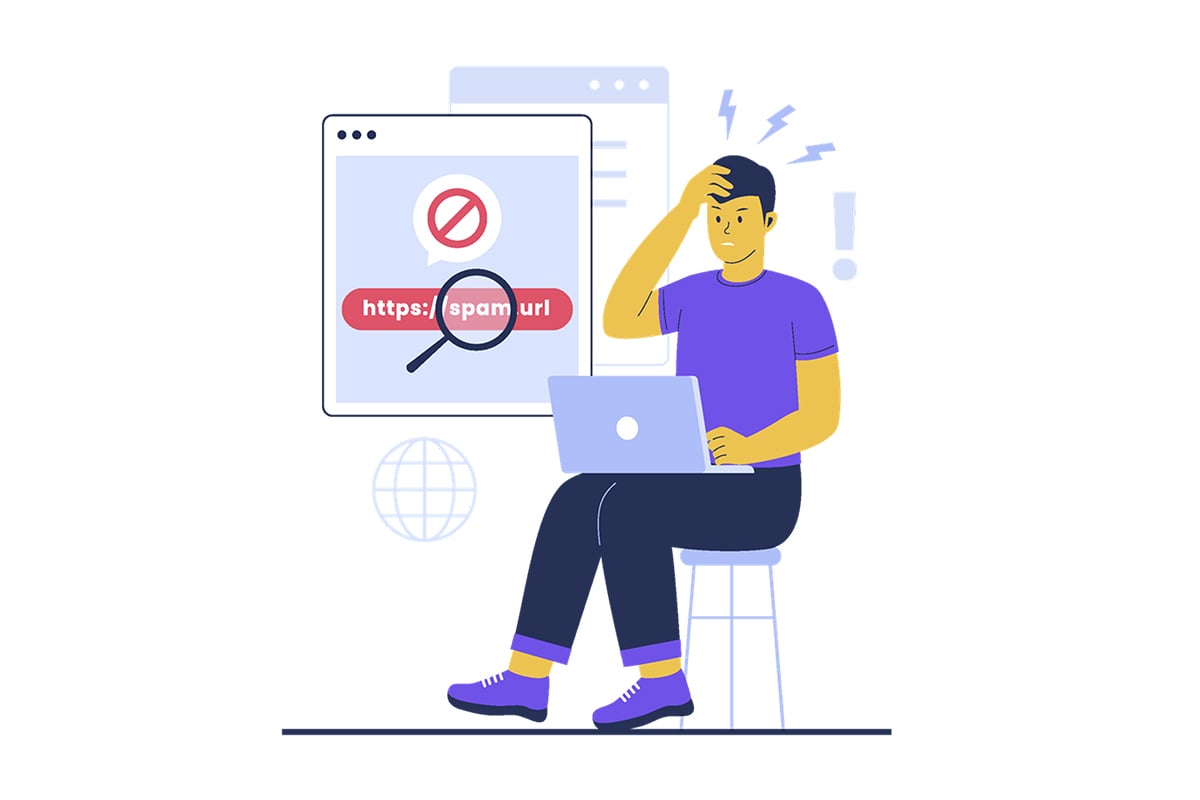
Hey there, hardworking business owners! Ever feel like building your own website is like trying to decipher an alien code? You're not alone.
Let's talk about the wild world of websites, where terms like "SEO," "responsive design," and "CMS" fly around like nails from a nail gun. But instead of neatly landing where they should, they often end up scattered all over the place, leaving us scratching our heads.
Diving into website building can feel like opening a toolbox and finding tools from another planet. You might have heard words like "HTML," "JavaScript," or "bandwidth" and thought, "Are these new power tools I've missed out on?" Spoiler: they're not.
Jump to:
- Common Questions (If You're Thinking About Creating Your Own Website)
- 20 Problems You're Guaranteed to Have If You Take It Upon Yourself to Create Your Small Business Website
In this blog, we're going to take an honest look at just how difficult it can be to build your own website. If you're up for the task because you like learning and want to be self-sufficient, more power to you. You should move forward expecting to trial-and-error your way to invaluable small business tech skills.
But if learning and self-sufficiency in the world of web design are not what you had in mind (there's not shame here - your hands-on business teaches you more than you need to know anyway), you may want to steer clear. And the goal of this blog is to show you why. It's a "fair warning" guide to save you from hours of labor and frustration that you may not have to spare.
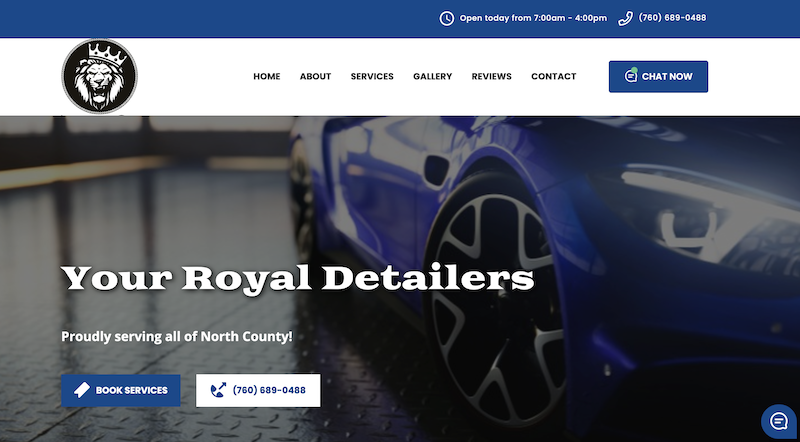 Beast Auto Detail is a GoSite Customer - Learn More About GoSite Sites
Beast Auto Detail is a GoSite Customer - Learn More About GoSite Sites
Soft Skills That Make You Up for the Task of Building Your Own Website
Before we get to the 20 problems with trying to build your own business site, let's first discuss the individual mentioned above. What if you still want to take a crack at building your own website, even though you've never done it before?
If you think you might be this person, here are some skills and character traits that you'll need to tap into to make your website a reality.
- Tech Enthusiast: You're genuinely interested in technology and get excited about learning new digital tools.
- Problem Solver: You love a good challenge and don't get easily frustrated when things don't work the first time.
- Detail-Oriented: Paying attention to the small things is your forte. Websites are all about the details.
- Creative Thinker: You have a knack for design and creativity, and enjoy expressing it in various forms.
- Patient and Persistent: You understand that Rome wasn't built in a day, and neither is a good website.
- Good at Time Management: You can find the time to dedicate to this project without neglecting your core business activities.
- Keen Learner: You're always up for learning new skills, whether it's through online tutorials, forums, or trial and error.
- Decent Writing Skills: You're comfortable writing content that reflects your brand's voice and communicates effectively with your audience.
- Strategic Planner: You can set clear goals for your website and plan out the steps to achieve them.
- Budget-Conscious: You prefer to do things yourself to save on costs, even if it means a steeper learning curve.
- Risk-Taker: You're not afraid to experiment and make mistakes – it's all part of the learning process for you.
- Self-Motivated: You don’t need external motivation to start and finish a project. Your drive comes from within.
- Resourceful: When faced with a problem, you're good at finding solutions, whether that means Googling, watching YouTube tutorials, or asking for help in online forums.
Remember, building your own website can be a rewarding journey, but it's not a small feat. It's like taking on a major DIY project; you need the right tools, skills, and a hefty dose of patience. But if you're up for the challenge, go for it! And for those who'd rather focus on what they do best and leave the website building to the pros, well, the rest of this blog is for you.
Common Questions (If You're Thinking About Creating Your Own Website)
How difficult is it to create your own website?
Creating your own website can range from fairly straightforward to quite challenging, depending on several factors:
- Your Tech Comfort Level: If you're comfortable with technology and willing to learn, it's more manageable. But if tech isn't your thing, it can feel pretty daunting.
- The Type of Website: A simple, static website is easier to make than a complex one with lots of features.
- Tools You Choose: Using a website builder like Wix or Squarespace simplifies the process, while using something like WordPress might have a steeper learning curve.
- Time and Patience: It takes time and patience to learn how to build and maintain a website, especially if you're doing it for the first time.
In short, if you're tech-savvy, have time to learn, and are building something simple, it's not too difficult. But if you're busy with your business and less comfortable with technology, it might be a tougher hill to climb.
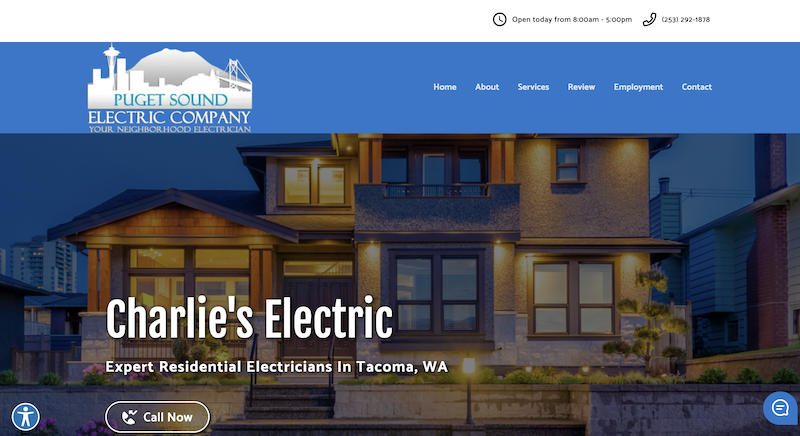 Pudget Sound Electric is a GoSite Customer - Learn More About GoSite Sites
Pudget Sound Electric is a GoSite Customer - Learn More About GoSite Sites
Why is it so hard to design a website?
Designing a website can be tricky because...
- You've Got to Learn the Ropes: It's a bit like learning a new tool. You need to get the hang of how website design works, which can be a bit technical.
- You Have to Make It Look Good and Work Well: It's like painting and organizing your shop. You want it to look inviting and make sure customers can find what they need easily.
- It Has to Match Your Business Style: Your website needs to show off what your business is all about, like making sure your truck's paint job matches your company logo.
- You Have to Stay Up-to-Date: Web design trends change like fashion. What's in style today might be old news tomorrow, so keeping your website looking modern is a bit of a juggling act.
- You Want Happy Customers When They Visit Your Site: You want your website to be easy and pleasant for folks to use, just like making sure your shop is easy to get around in.
- It Must Work Everywhere: Your website needs to work well whether someone's looking at it on a big computer or a small phone, kind of like how your tools need to work in all sorts of different jobs.
Is it worth it to build your own website?
Whether it's worth it to build your own website really depends on a few key things:
- Your Time: Consider if you have enough time. Building a website is like taking on a side project. If you're already swamped with work, it might be too much.
- Interest in Tech: If you're curious about technology and enjoy learning new skills, you might find building a website rewarding, kind of like mastering a new tool in your trade.
- Cost Savings vs Professional Quality: Doing it yourself can save money, but a professional might do a slicker job. It's like DIY plumbing versus hiring a plumber – both have their pros and cons.
- Long-Term Maintenance: Like any tool in your business, a website needs upkeep. If you're up for the ongoing maintenance, great. If not, consider getting help.
- Your Business Needs: Think about what your website needs to do. If it's simple, DIY might be fine. But for something complex, professional help could be better.
What is the hardest part of creating a website?
The hardest part is often just getting started and then balancing all the different elements – design, content, functionality, and maintenance. It's a bit like juggling a bunch of different tools at once, each needing its own kind of attention.
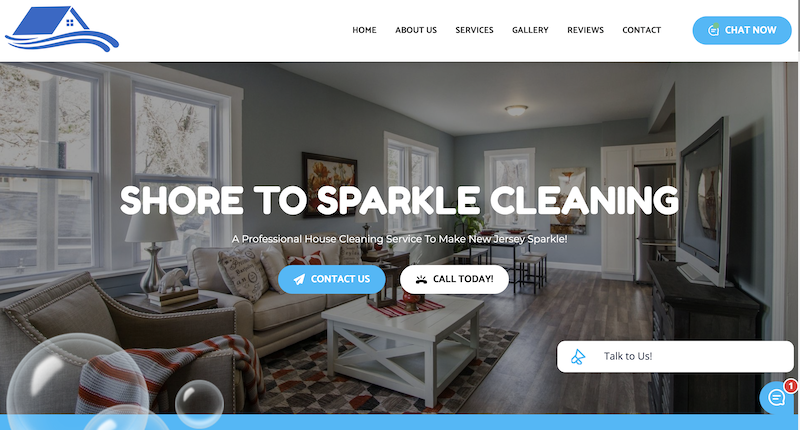 Shore to Sparkle Cleaning is a GoSite Customer - Learn More About GoSite Sites
Shore to Sparkle Cleaning is a GoSite Customer - Learn More About GoSite Sites
Can a beginner design a website?
In short, yes, a beginner can design a website, but it takes time, the right tools, and a willingness to learn and experiment.
What is considered a bad website design?
A bad website design is usually one that makes things hard for your customers. Here are some tell-tale signs:
- Hard to Navigate: If people can’t find what they need easily, it’s like walking into a store with no signs. Frustrating and confusing.
- Too Slow: Websites that take forever to load are like waiting in a long line at the store. People don’t have the patience and will leave.
- Not Looking Good on Phones: A lot of folks use their phones for everything. If your site looks bad or doesn’t work right on a phone, it’s like having a shop that’s hard to get into.
- Too Cluttered: Overloading your site with too much stuff – too many pictures, text, or colors – is like a cluttered workshop. It’s overwhelming and people can’t find what they need.
- Outdated Design: An old-looking website can give the impression your business isn’t up-to-date. It’s like having a faded, peeling sign outside your shop.
- Hard to Read: Small or fancy fonts that are hard to read are like giving customers instructions in handwriting they can't decipher.
- Not Secure: Websites without proper security are a big no-no. It's like leaving your shop’s door unlocked at night.
How long should it take to design a website?
Designing a basic website might take a few days, while a more involved one could take much longer. It's all about how complex your site is and how prepared you are. If you're a typical local service provider, you don't need anything too complex, though both functionality and design are critically important.
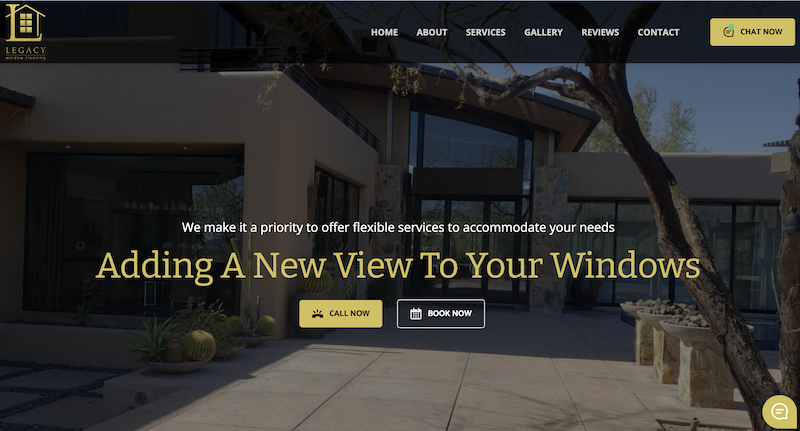 Legacy Professional Window Cleaning is a GoSite Customer - Learn More About GoSite Sites
Legacy Professional Window Cleaning is a GoSite Customer - Learn More About GoSite Sites
Why do most websites fail?
Most websites fail for a few key reasons, much like common pitfalls in any business:
- Not User-Friendly: If a website is hard to navigate or slow, it's like a shop where customers can't find what they want or have to wait in long lines. They'll just leave.
- Poor Content: Websites with outdated, unclear, or unhelpful content are like a salesperson who doesn't know their product. If your website doesn't answer your customers' questions, they won't stick around.
- Not Mobile-Friendly: Many people use their phones for everything. If your website doesn’t work well on mobile, it’s like having a store that’s hard to get into. Customers will go elsewhere.
- Weak Online Visibility: If your website doesn't show up in search results, it’s like having a billboard in the middle of nowhere. SEO is crucial to get your site seen.
- Lack of Updates: A website that’s not regularly updated is like a shop that never changes its window display. It gets stale and uninteresting.
- No Clear Purpose: If your website doesn't have a clear goal (like selling products, getting appointments, or providing information), it's like a business without a plan. Customers won't know what to do there.
- Ignoring Customer Feedback: Not listening to what your visitors have to say about your site is like ignoring customer complaints. It's a missed opportunity to improve.
What is the first thing to consider when designing a website?
The first thing to consider when designing a website is knowing your audience. It's like knowing who you're selling your services to in your business. Ask yourself:
- Who are they? Understanding who your customers are – like homeowners, other businesses, or young families – helps tailor your site to their needs.
- What do they need? Figure out what your audience is looking for when they visit your site. Is it information about your services, the ability to book appointments, or buy products?
- How can you help them? Your website should make it clear how your business solves their problems or meets their needs.
20 Problems You're Guaranteed to Have If You Take It Upon Yourself to Create Your Small Business Website
1. Tech Troubles
Getting into the nuts and bolts of website building can be like trying to learn a new trade overnight. You might find yourself tangled in all the tech speak and software. It's like trying to fix a leak with a wrench that doesn't fit.
2. Not Enough Hours in the Day
Building a website can eat up time like a big job on a tight deadline. You're already juggling a million things, from managing jobs to keeping customers happy. Fitting in website work is like trying to squeeze in one more job at the end of a long day.
3. Getting Found on Google
It's like putting up the best sign for your business, but in the online world. If your website isn’t set up right, it's like that sign is hidden down a back alley where no one can see it. You need the right tricks to make your site pop up when customers are looking.
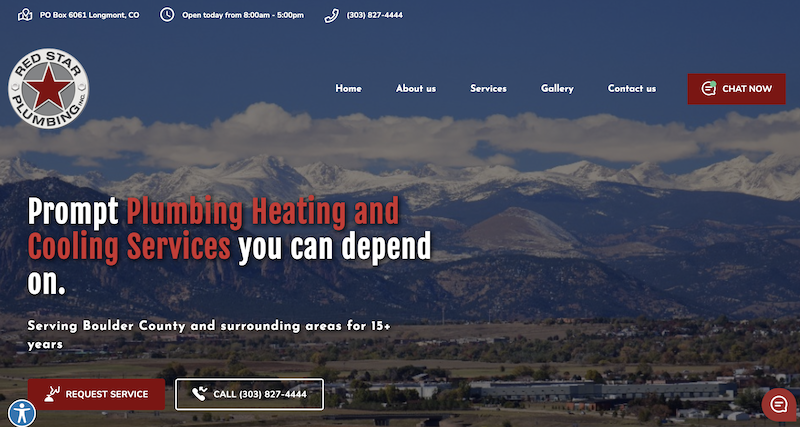 Red Star Plumbing is a GoSite Customer - Learn More About GoSite Sites
Red Star Plumbing is a GoSite Customer - Learn More About GoSite Sites
4. Keeping Things Safe
Your website's security is as important as locking up your tools at the end of the day. Without the right security, hackers can break in and mess things up. It’s like leaving the door to your shop wide open when you go home at night.
5. Phones and Tablets Matter... A lot
Everyone’s using these little devices, so your site needs to work well on them, not just on a computer. If it doesn’t, it's like handing out flyers that are too blurry to read. You want a site that looks good and is easy to use, no matter what device your customer is on.
6. Linking Everything Up
Getting your website to work with the systems you already use can be a real head-scratcher. It's like trying to fit a new part into an old machine – they don’t always go together easily. This can be stuff like your appointment scheduler or your inventory list.
7. Money Matters
Those "free" or "cheap" website builders can start adding costs for extra features, like a fancy paint job on a truck. You think you're getting a deal, but then the extras pile up and suddenly you're paying a lot more than you expected.
8. Slow as Molasses
A slow website can drive customers away like a bad smell in a restaurant. If your site takes too long to load, people will lose patience and leave. You need a fast-loading site to keep customers' attention.
9. Who Ya Gonna Call?
When things go wrong, or you just can't figure something out, you need help, fast. But finding someone who can help, especially if you're using a DIY website builder, can be like finding a needle in a haystack. It's important to have good support you can count on.
10. Upkeep and Care
Like any important tool in your business, your website needs regular maintenance to stay in top shape. This means updating content, fixing bugs, and making sure everything is running smoothly. Neglecting this is like skipping regular maintenance on your work vehicle.
11. Making it Easy for Customers
Your website should be easy to navigate, just like a well-organized workshop. If customers can't find what they need quickly, they'll get frustrated. You want a site that's as user-friendly as a simple tool, not one that's complicated to figure out.
12. Keeping it Fresh
Your website needs fresh content regularly, like a shop window that changes display to attract customers. This could be new photos of your work, updates on services, or helpful tips. It keeps customers interested and coming back.
13. What’s Working and What’s Not
Understanding your website's analytics is like reading a map to find where your customers are coming from. It can show you what's working and what's not, but it can be as tricky as learning a new language. This info is key to making smart business decisions.
14. Staying True to Your Brand
Your website should reflect what your business is all about – your brand. It's like wearing your company uniform so customers recognize you. Make sure your website shows off your unique style and professionalism.
15. Standing Out
You don’t want a website that looks just like your competitor's. Using the same old templates is like having a truck that looks exactly like everyone else's. Your site should stand out and show what makes your business special.
16. Talking to Customers Right
Figuring out what to say on your site can be as tricky as explaining a complicated job in simple terms. You need clear, engaging content that speaks to your customers and tells them why they should choose you.
17. Photos and Videos That Work
Using high-quality images and videos is key, but they need to be optimized so they don't slow your site down. It's like having a great billboard, but it needs to be in the right spot to get noticed without causing a traffic jam.
18. Backup Blues
Regular backups are critical, just like backups for your important job files. If something goes wrong, like your site getting hacked or crashing, you need a backup to restore everything. It's like insurance for your online presence.
19. Dotting the I’s and Crossing the T’s
There are laws about what you can and can’t do on a website, like privacy rules and making your site accessible to everyone. It's like following building codes and safety regulations in your work.
20. Looking Sharp
First impressions are everything. Your website should look professional and polished, like a clean, well-organized shop. This shows customers that you're serious and trustworthy.
Summing Up
In wrapping up, we've navigated the twists and turns of website building, much like a complex plumbing or landscaping project. It's clear that creating a website is no small feat. It demands time, technical savvy, and a whole lot of patience – resources that are already stretched thin in the busy life of a small business owner.
While some of you may feel the thrill of tackling this digital challenge head-on, remember that your time and energy are precious. You're the expert at what you do, whether that's keeping homes warm, gardens lush, or pipes flowing. Why not let an expert take the reins on your website, too?
That's where we come in. We understand your business needs and have the tools and expertise to build you a website that not only looks great but works seamlessly to bring you more customers. By partnering with us, you ensure that your online presence is in skilled hands, leaving you free to focus on what you do best – running your business and serving your customers.
So, before diving into the deep end of website design, consider this: the smartest tool in the toolbox is often the one that knows when to call in a specialist. Let us be that tool for you. Together, we'll build not just a website, but a stronger, more visible, and more efficient online extension of your business.
%20(1)%20(1).png?width=340&name=Group%2012%20(2)%20(1)%20(1).png)

